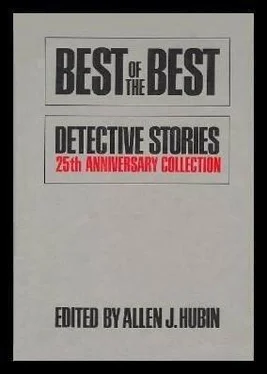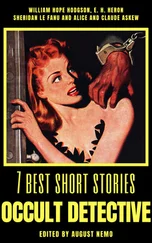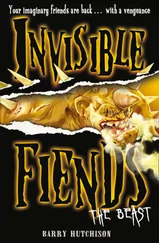Stephen Barr - Best of the best detective stories - 25th anniversary collection
Здесь есть возможность читать онлайн «Stephen Barr - Best of the best detective stories - 25th anniversary collection» весь текст электронной книги совершенно бесплатно (целиком полную версию без сокращений). В некоторых случаях можно слушать аудио, скачать через торрент в формате fb2 и присутствует краткое содержание. Город: New York, Год выпуска: 1971, ISBN: 1971, Издательство: E.P. Dutton & Co., Жанр: Детектив, на английском языке. Описание произведения, (предисловие) а так же отзывы посетителей доступны на портале библиотеки ЛибКат.
- Название:Best of the best detective stories: 25th anniversary collection
- Автор:
- Издательство:E.P. Dutton & Co.
- Жанр:
- Год:1971
- Город:New York
- ISBN:978-0-525-06450-3
- Рейтинг книги:5 / 5. Голосов: 1
-
Избранное:Добавить в избранное
- Отзывы:
-
Ваша оценка:
- 100
- 1
- 2
- 3
- 4
- 5
Best of the best detective stories: 25th anniversary collection: краткое содержание, описание и аннотация
Предлагаем к чтению аннотацию, описание, краткое содержание или предисловие (зависит от того, что написал сам автор книги «Best of the best detective stories: 25th anniversary collection»). Если вы не нашли необходимую информацию о книге — напишите в комментариях, мы постараемся отыскать её.
Best of the best detective stories: 25th anniversary collection — читать онлайн бесплатно полную книгу (весь текст) целиком
Ниже представлен текст книги, разбитый по страницам. Система сохранения места последней прочитанной страницы, позволяет с удобством читать онлайн бесплатно книгу «Best of the best detective stories: 25th anniversary collection», без необходимости каждый раз заново искать на чём Вы остановились. Поставьте закладку, и сможете в любой момент перейти на страницу, на которой закончили чтение.
Интервал:
Закладка:
“Late this afternoon Ellen phoned me at my office. She was very upset. She had just come from police headquarters, where she had been shown photos, but she hadn’t seen the gunman’s. She could describe him only vaguely because he had no outstanding characteristics, but she was sure she would recognize him if she ever saw him again. I told her I’d be over right after work to take her out to dinner and help her get over her terrible experience. At six o’clock I phoned her again. She said she was feeling better. But when I got here at seven-thirty—” Crane’s voice broke.
“Go on,” Blanchard urged.
“Ellen didn’t answer the door when I rang. I found it unlocked. I walked in, and there was Ellen, just the way she is now. Then I heard somebody behind me, and that’s all I know.” Crane shivered. “I guess after a while I recovered consciousness and picked up my hat and went out, but I don’t remember.”
“And you didn’t see the guy?”
“Not then,” Crane said. “But later.” And he told about the swarthy man.
Lieutenant Blanchard frowned. “The man she described was tall and rather gaunt.”
“Then it was the other man who murdered us,” Crane said. One of the detectives in the room uttered an exclamation. Every pair of eyes stared at Crane. He realized what he had said. Us! The man had murdered us!
Well, wasn’t that the truth?
He wet his lips and went on: “The swarthy man must have been the gunman whose face Ellen didn’t see. In fact, he was mostly outside the door during the holdup, so she hadn’t even been able to describe his build. But he was the one who murdered her.”
Gravely Blanchard nodded. “It’s likely.”
Crane got up on one elbow and felt bitterness choke him. “Damn you, didn’t you know she’d be in danger? Wasn’t she entitled to police protection?”
Blanchard said quietly, “She didn’t identify anybody. We didn’t have the photo in our gallery. Why should anybody guess she wouldn’t be safe?”
“You cops let her die!” Crane cried. “The gunman must have had a police record elsewhere. He was afraid Ellen would be shown photos from other cities. Sooner or later she would have spotted him. He couldn’t let her live.”
Dr. Rowland placed a hand on his shoulder. “Take it easy, son... Lieutenant, I can’t allow this man to be excited.”
Blanchard shrugged. The gesture*said: He’s practically a dead man anyway, so what difference does it make?
An ambulance interne arrived with the driver, who carried a stretcher. The interne glanced down at Crane, whistled softly, and did nothing to treat or even bandage the wound. It was too dangerous, or there was no use. The fact remained that they were taking him to die away from here.
When they transferred him to the stretcher, Crane opened his mouth to protest that he could walk under his own power. But it was less effort to let them just carry him away. Nothing was important. Ellen was dead, and so he was not afraid of death.
But there was something to be done. He wasn’t sure just what it was, and lay thinking about it until cool air washed over him and he knew that he was in the street. Then he saw it.
“Wait a minute!” Crane said, lifting his head.
The stretcher stopped. The interne, holding the front end, turned his head to look down at him.
“There’s not a thing that can be done for me,” Crane said. “I know. I should by rights be dead. Ellen was struck no harder than I was. There must be a reason why I was kept alive. Twice I should have died and didn’t — the second time when the swarthy man shot at me and nothing happened. I’ve been thinking, and the only answer is that I’ve been given time to find Ellen’s murderer. That’s why the swarthy man was sent my way when I was in the lunchroom, but I didn’t know who he was at the time. Now I’ve got to find him again.”
The driver said: “He’s starting to rave. Doc.”
“No,” Crane insisted. “My brain has never been clearer. That’s another miracle, for the bits of bone are pressing into my brain. And why didn’t I bleed to death?”
“Lie still,” the interne told him. “You can never tell about those head injuries. No two act the same way.”
“Why bother kidding me?” Crane said wearily. “I’ve been lent time to find Ellen’s murderer. It can’t be any other way. So you’ve got to let me go.”
“We’ll fix you up fine in the hospital,” the interne said soothingly. “Then you can go anywhere you like. Let’s go, George.”
As the stretcher started to move again. Crane considered making a break for it. But they would have their hands on him before he could get off the stretcher, and a struggle might be too much for him. He had to stretch his borrowed time. Perhaps when they reached the hospital they would leave him alone in the ambulance long enough for him to slip away.
They slid the stretcher into the ambulance. The driver went around to the front. The interne was about to climb inside with Crane when he paused to slap his pockets.
“Got a cigarette, George?” he called.
“You know I don’t use ’em. There’s a drugstore still open at the corner.”
The interne sauntered off. Slowly, Crane sat up. Through the still open doors the street stretched out before him. He had told them that he wanted to escape, but they had put it down to the ravings of a badly injured man. And they were not guarding him now because they could not conceive of a man with a wound like that getting up and walking away.
Then he was standing outside the ambulance, glancing cautiously about the empty street for either the interne or the driver. He was alone.
Not quite alone. The tail of his eye caught movement in the dark doorway across the street. No more than that. No definite shape — only a stirring of deeper shadows. But he knew that it had to be the swarthy man, because he had been kept alive for only one reason. He started across the street.
The shadow moved out of the doorway and became the stocky figure of a man. He peered at Crane with his head far forward. He pulled his gun out.
Crane felt no fear. He kept going across the gutter. The swarthy man had been placed there for him by the same power that was keeping him. Crane, alive.
And the swarthy man did not shoot. With the revolver dangling forgotten from his swinging hand, he raced down the street.
Crane broke into a run. At once, nausea seized him. His head reeled; he almost fell. Careful , he told himself. That’s one thing you can’t do .
He walked as rapidly as he could. He followed the swarthy man around the corner, and when he saw him again, the distance between them had grown to a hundred feet. Crane ran two steps and brought himself up short before he keeled over. He could not run without jerking his head. A sob of helplessness tore from his throat. He kept walking, but the other was already out of sight.
After a while Crane leaned against the wall of a house to rest. He was sick now to the core of his being and his hat seemed to weigh a ton. Only he wasn’t wearing a hat; it had been left in Ellen’s apartment. He knew then that he hadn’t much more time.
Suddenly he laughed with a bitterness that shook him. If some sort of divine Providence was keeping him alive for a certain job, then why hadn’t Providence let him complete the job by catching the swarthy man? Now he had the whole city to hunt for him. That would baffle even the police, with limitless time and manpower.
But wait. There had to be a logical explanation why he had twice come across the swarthy man in the last hour. The second one was easy. The swarthy man had murdered Ellen; he had returned to the scene of the crime to learn if there were any developments which affected him.
Читать дальшеИнтервал:
Закладка:
Похожие книги на «Best of the best detective stories: 25th anniversary collection»
Представляем Вашему вниманию похожие книги на «Best of the best detective stories: 25th anniversary collection» списком для выбора. Мы отобрали схожую по названию и смыслу литературу в надежде предоставить читателям больше вариантов отыскать новые, интересные, ещё непрочитанные произведения.
Обсуждение, отзывы о книге «Best of the best detective stories: 25th anniversary collection» и просто собственные мнения читателей. Оставьте ваши комментарии, напишите, что Вы думаете о произведении, его смысле или главных героях. Укажите что конкретно понравилось, а что нет, и почему Вы так считаете.












